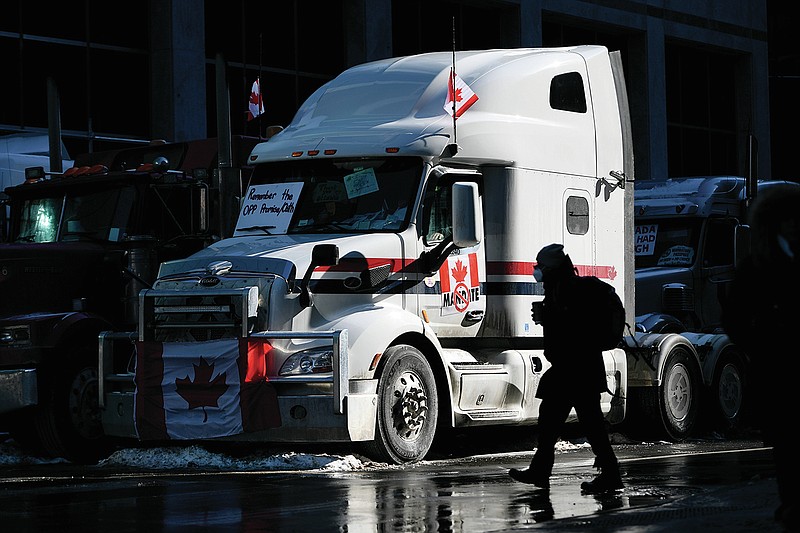TORONTO -- The busiest crossing on the U.S.-Canada border was obstructed Tuesday as demonstrations against vaccine mandates and other coronavirus measures that have paralyzed Canada's capital spread to a crucial trade artery.
The Canada Border Services Agency said Tuesday that the Ambassador Bridge, which links Windsor, Ontario, to Detroit, was "temporarily closed" to passengers and commercial traffic. The Michigan Department of Transportation also said the border was closed. Windsor police said "limited traffic" was being allowed into the United States.
The suspension bridge, which spans the Detroit River, is an important trade link, particularly for the auto industry on both sides of the border.
On Monday, Prime Minister Justin Trudeau urged the self-styled "Freedom Convoy," which since Jan. 28 has jammed major thoroughfares in downtown Ottawa with idling rigs and other vehicles, to go home.
"Individuals are trying to blockade our economy, our democracy and our fellow citizens' daily lives. It has to stop," he said in an emergency debate in Parliament.
The convoy started as a protest against U.S. and Canadian rules that require cross-border truckers to be fully vaccinated to enter their countries. But its grievances are now wide-ranging. Some protesters want an end to all public health measures, most of which are imposed by provinces, while others are directing their ire at Trudeau.
In Ottawa, the number of people involved in the protests has fallen significantly since the weekend, but rows of rigs have continued their blockade. Local media reported a relatively quiet Monday night after a judge granted a temporary injunction barring protesters from incessantly honking their horns.
The Canadian Vehicle Manufacturers' Association called for "an immediate end" to the blockades, saying they are "threatening fragile supply chains already under pressure due to pandemic-related shortages and backlogs."
"Auto production relies on efficient supply chain logistics for delivery of parts, components and vehicles," Brian Kingston, the group's chief executive, said in a statement. "Persistent delays at the Ambassador Bridge risk disrupting automotive production that employs tens of thousands of Canadians."
Police in Ottawa worked to regain control of the capital, towing vehicles, seizing fuel and attempting to disband what Police Chief Peter Sloly has called a "siege" and an "unlawful" blockade.
"Canadians have the right to protest, to disagree with their government, and to make their voices heard. We'll always protect that right," Trudeau tweeted Monday. But he said protesters do not "have the right to blockade our economy, or our democracy, or our fellow citizens' daily lives."
